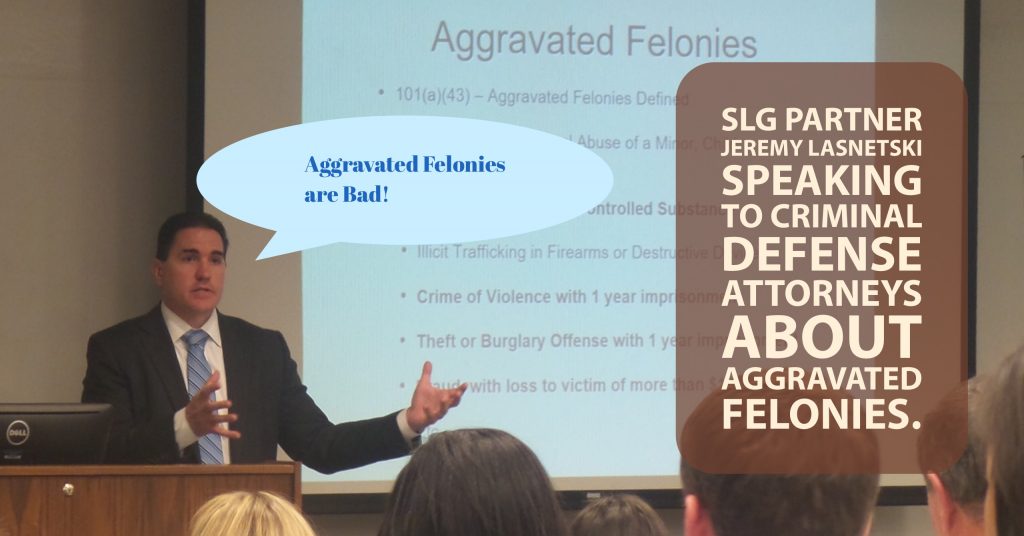
Any criminal arrest or conviction will have some negative consequence for a non-citizen. Whether it is prolonged delay at the border while Custom and Border Protection (CBP) agents ask you questions, whether you are denied a bond in immigration court, whether you are denied the right to become a United States citizen or whether you are placed in deportation proceedings, criminal charges are bad. Some criminal cases will have more severe consequences than others. When it comes to the worst possible criminal conviction you can have, Aggravated Felonies are at the top of that list.
AGGRAVATED FELONIES ARE BAD!
Aggravated Felonies are bad! Real bad. They are referred to in many different provisions of the Immigration and Nationality Act. They almost always will result in deportation. They prevent a person from ever becoming a United States citizen. And they preclude you from obtaining almost all forms of relief in immigration proceedings.
So what is an Aggravated Felony? Well, it is neither necessarily aggravated, nor a felony. Hope that clears it up. An Aggravated Felony can be for a rather typical offense and it can even be a misdemeanor. Aggravated Felonies are enumerated in Section 101(a)(43) of the Immigration and Nationality Act. They include your no-brainers, like murder, rape, and sexual abuse of a minor. But they also include offense like trafficking in a controlled substance and trafficking in firearms. They include Fraud convictions with loss in excess of $10,000. They include burglary and theft offenses where the imprisonment was for at least one year. They include certain immigration crime convictions and other types of convictions. They also include crimes of violence with incarceration of one year or more.
This definition is extremely vague and over broad. What is a crime of violence? Does a Florida drug conviction qualify as “an illicit trafficking in a controlled substance” offense as defined under federal law? Does the minimal conduct required to be convicted of a theft offense in Florida qualify under the definition of theft under federal law? These are all questions that are litigated in courts on a daily basis.
WHETHER A CRIME IS AN AGGRAVATED FELONY CAN SOMETIMES BE UP IN THE AIR
The confusion comes from the interpretation of the aggravated felony statute in relation to the statutory construction of various state statutes. People are typically convicted of crimes in state courts after violating state statutes. Immigration law is federal. So, the courts have to interpret whether a conviction under a specific state statute would qualify as a violation of federal law. For example, a person convicted of battery in Florida and given one year in jail would not necessarily be convicted of an Aggravated Felony because one can be convicted of battery by simply touching another individual against his or her will. Therefore, the minimal conduct required to be convicted of battery in the State of Florida is not enough to rise to the level of a crime of violence under federal law. Johnson v. United States, 130 S.Ct. 1265 (2010).
NEGOTIATION IS KEY TO AVOIDING AN AGGRAVATED FELONY
A criminal attorney who knows immigration law can oftentimes negotiate a non-Aggravated Felony disposition even when the evidence is strong. Negotiation is part of the criminal process. The State has an interest in the judicious resolution to criminal cases. The prosecutor will often agree to negotiate a plea to a different charge. Sometimes, there are similar charges that would not even render the person deportable. Savvy negotiation is key to avoid the dreaded Aggravated Felony conviction.
Aggravated Felonies affect lawful permanent residents and non-lawful permanent residents alike. It doesn’t matter how long you’ve been here or how good of a person you are. The negative consequences of Aggravated Felonies are devastating with few, if any, exceptions. If you are charged with an aggravated felony or have a client who is charged with an aggravated felony, make sure you understand the immigration consequences of pleading guilty or being found guilty of an Aggravated Felony.
 Florida Immigration Lawyer Blog
Florida Immigration Lawyer Blog

